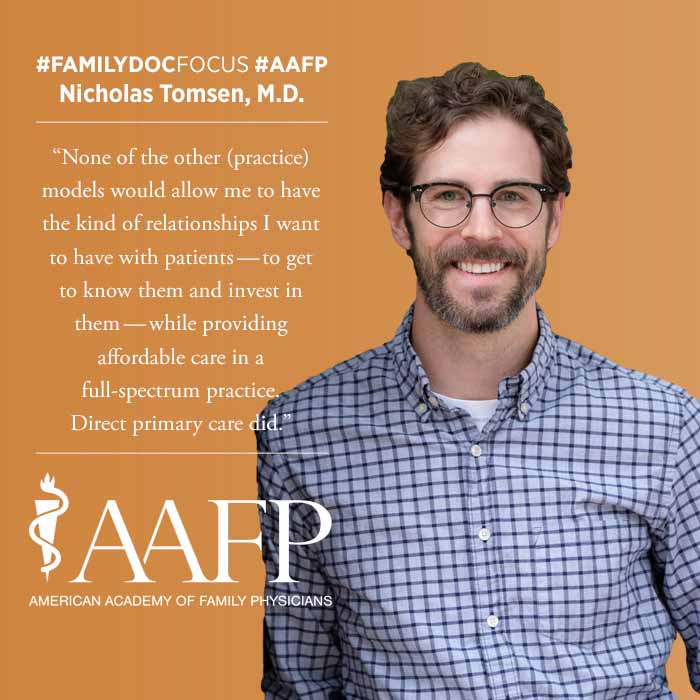DPC Was His Solution for Affordable, Full-scope Care
June 29, 2020, 01:34 pm David Mitchell – Nicholas Tomsen, M.D., completed the Via Christi Family Medicine Residency program in Wichita, Kan., in 2014, but he wasn't finished with training. Tomsen accepted the program's international fellowship, which included spending five months in Niger in a village on the edge of the Sahara Desert.

"It was a very difficult place to practice," Tomsen said. "I didn't have all the things that I needed, but I used what I did have to give the best care I could."
The fellowship included clinic, inpatient and obstetric care. He managed cases of malaria, typhoid, tuberculosis and malnutrition, and performed dozens of cesarean sections with complications, including delivering triplets and dealing with uterine rupture.
When it was over, Tomsen felt well prepared to start a full-scope family medicine practice. He accepted a job with a federally qualified health center in Wichita, but it soon became clear he wasn't going to be allowed to use all the skills he had worked so hard to learn. He wasn't doing procedures, deliveries or inpatient care.
"I said, 'This isn't what I signed up for, and I'm going to look for something else,'" he said. "I went back to the drawing board."
Tomsen considered starting his own FQHC, opening a traditional fee-for-service clinic and pursuing teaching roles.
"None of the other (practice) models would allow me to have the kind of relationships I want to have with patients -- to get to know them and invest in them -- while providing affordable care in a full-spectrum practice," he said. "Direct primary care did."
Tomsen took a part-time teaching role and worked locums to keep his skills sharp and to earn start-up money for a DPC practice. He turned to fellow Kansas family physicians Josh Umbehr, M.D., and Ryan Neuhofel, D.O., M.P.H., for valuable advice on the basics of setting up a DPC practice, but there were few DPC docs doing maternity care at that time. Tomsen viewed providing affordable care -- including obstetrics -- to Wichita's underserved patients as vital to his mission. So, just as he had in Niger, he figured out a way to give patients the best care possible even when those patients didn't have everything they might need.
Like many DPC practices, Tomsen charges patients a monthly membership fee that gives them access to same-day or next-day appointments, wholesale-priced medications, reduced-price labs and imaging, free or low-cost procedures, and longer appointments.
Pregnant patients can pay an additional monthly fee that covers outpatient visits, ultrasounds, labs, immunizations and physician services in the hospital. The practice is in the process of negotiating cash-price discounts with the local hospital, and in the meantime, it helps patients navigate the cash-pay discount system that is currently in place. Tomsen estimates the overall cost for his patients is roughly $3,000 less than what would typically be billed to a patient's insurance.
The practice has two other physicians (and will soon add a fourth), and they also provide obstetric care. Tomsen said children account for roughly 30% of the practice's patient panel.
"We deliver a lot of babies, and it's really driven our growth," he said. "Our practice is skewed toward young families."
In addition to OB, the practice provides a wide range of procedures, including vasectomy, colposcopy and skin lesion excision.
Tomsen, who is adjunct faculty at Via Christi, acknowledges that he's landed in a sweet spot for what he's doing. He has a close, ongoing relationship with the hospital where he trained and lives in a state with relatively low costs for malpractice insurance. But he's doing what he can to spread the word that full-scope practice is possible in the DPC model. And even if his peers aren't interested in OB, maybe he can convince them to reclaim some of their scope.
"If you're not doing procedures, you probably aren't going to jump back into OB," said Tomsen, who will be one of the speakers in a session about full-scope direct primary care July 17 during the virtual DPC Summit. "But maybe you might take off a toenail or provide cryotherapy for a precancerous lesion."
Just like Umbehr and Neuhofel helped him five years ago, Tomsen is eager to help the next wave of physicians who are interested in DPC.
"That's something we love," he said, "physicians helping other physicians."